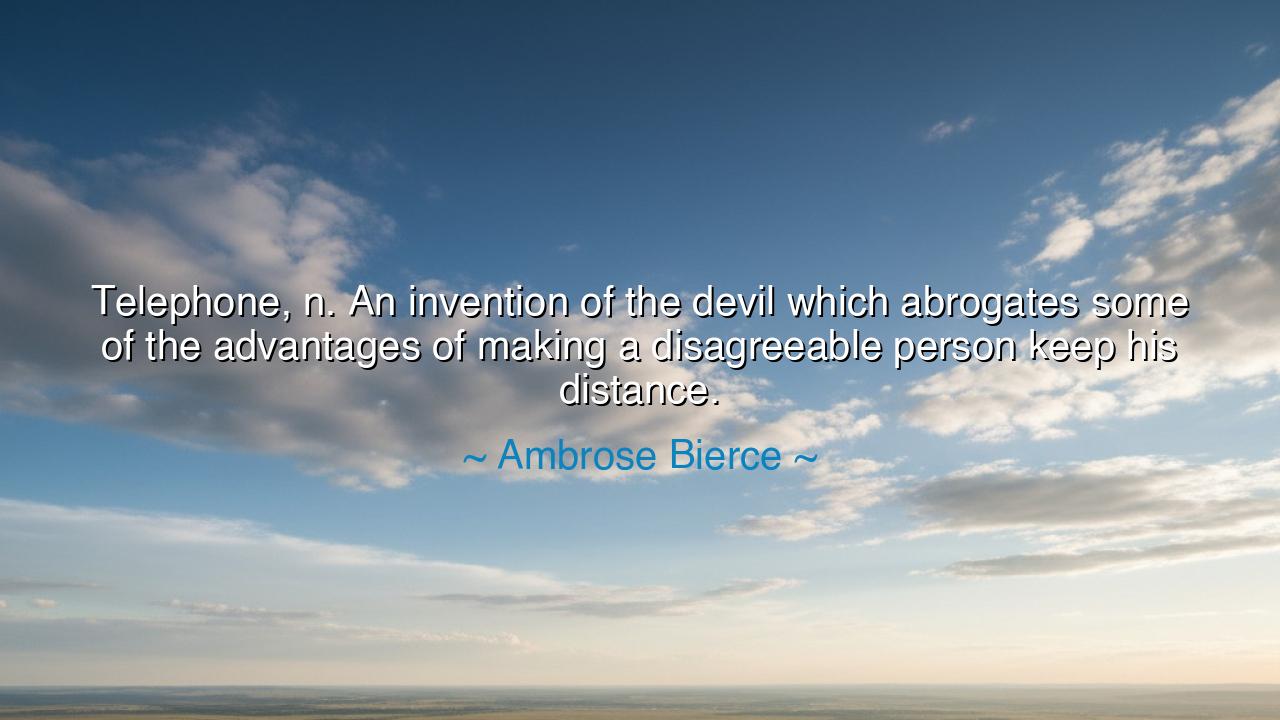
Telephone, n. An invention of the devil which abrogates some of
Telephone, n. An invention of the devil which abrogates some of the advantages of making a disagreeable person keep his distance.






Hear the biting wit of Ambrose Bierce, satirist and skeptic of modernity, who in his Devil’s Dictionary defined the telephone thus: “An invention of the devil which abrogates some of the advantages of making a disagreeable person keep his distance.” Though cast in jest, these words carry a truth deeper than satire. They reveal the double-edged nature of invention: that every tool which draws us closer also diminishes the safety of distance, that every gain of connection brings with it a loss of silence.
The telephone, hailed in its day as a marvel, shattered the boundaries of space. Where once a man had to walk miles to deliver his thoughts, he could now speak across oceans. Families were united, businesses thrived, governments quickened their reach. Yet Bierce, in his sharp vision, saw not only the glory but the cost: the loss of distance, the invasion of privacy, the sudden ability of the disagreeable person to pierce your solitude without warning, without effort, without the buffer of time or travel. What once required presence now demanded attention instantly, whether one welcomed it or not.
Consider the tale of Alexander Graham Bell, who first brought voice into wire. He dreamed of a device to aid the deaf and to connect humanity. Yet from its birth, the telephone was both blessing and curse. It brought urgent news swiftly, but also endless interruptions. It tied man more tightly to his business and household, for the ring of the bell could not easily be ignored. Bierce, master of irony, gave voice to the quiet frustration of countless souls who discovered that convenience also meant captivity.
The meaning of this quote runs deeper still: every technology that collapses distance also collapses boundaries. The disagreeable person, once kept away by geography and circumstance, may now intrude into your inner world. What Bierce mocked in the telephone has multiplied a thousandfold in later ages, when not only the call but the message, the email, the notification, and the endless ping pursue us into every corner of life. The devil he names is not merely the machine, but the surrender of human peace to endless access.
And yet, even in his satire, there lies wisdom for the ages. The devil in every invention is not only the device itself, but the human failure to govern its use. The telephone need not enslave—it can be silenced, set aside, or used with discernment. But too often, men become servants of their tools, answering every call, yielding to every interruption, forgetting the sacredness of distance and silence. Bierce’s scorn reminds us that the responsibility lies not only in the invention, but in the discipline of its use.
The lesson for us is timeless: guard your distance. Value the spaces of solitude and quiet. Use technology to connect with love and purpose, but do not allow it to strip away your boundaries. Not every call must be answered, not every message replied to, not every voice admitted into your inner chamber. In a world where every person may reach you at once, you must become the guardian of your own silence.
Therefore, beloved seeker, take action. Do not despise the telephone or its descendants, but use them wisely. Set boundaries, preserve stillness, and remember that connection without rest breeds only weariness. Choose when to open the door, and when to keep it shut. For in this balance lies freedom—the ability to embrace the gift of communication without surrendering your peace.
Thus the words of Ambrose Bierce, though satirical, endure as prophecy: “The telephone is an invention of the devil.” Let us hear his laughter, but also his warning. For in every new invention that bridges distance, we must remember the ancient truth: closeness is power, but distance is peace. Only the wise know when to choose each.






AAdministratorAdministrator
Welcome, honored guests. Please leave a comment, we will respond soon